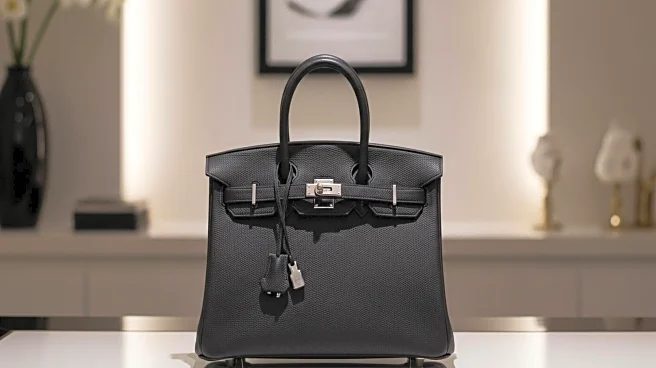What is the story about?
What's Happening?
A federal judge in California has dismissed an antitrust lawsuit against Hermès, which accused the luxury brand of illegally tying the sale of its Birkin handbags to the purchase of other Hermès products. The lawsuit, filed by Tina Cavalleri, Mark Glinoga, and Mengyao Yang, claimed that Hermès coerced customers into buying additional items like scarves and jewelry to qualify for purchasing a Birkin bag. The plaintiffs argued that this practice violated the Sherman Act and California state laws. However, Judge James Donato ruled that the plaintiffs failed to establish a plausible market definition, market power, or anticompetitive harm, leading to the dismissal of the federal claims with prejudice. The court also declined to exercise jurisdiction over the state law claims, leaving the plaintiffs to pursue their case in state court.
Why It's Important?
The dismissal of this case highlights the challenges of applying antitrust laws to luxury retail practices. Hermès' strategy of requiring customers to make prior purchases before offering them a Birkin bag may seem unfair to some consumers, but the court found no evidence of harm to competition. This ruling is significant for Hermès, as it reinforces the legality of its sales practices and protects its business model from antitrust scrutiny. For consumers, the decision serves as a reminder that exclusivity in luxury goods does not necessarily constitute an antitrust violation unless it results in market foreclosure. The case underscores the difficulty of fitting luxury retail practices into the rigid framework of U.S. antitrust law.
What's Next?
With the federal claims dismissed, the plaintiffs may choose to pursue their remaining state law claims in state court. This could involve redefining their arguments to better fit state legal standards. Meanwhile, Hermès will likely continue its current sales practices, bolstered by the court's decision. The ruling may also influence other luxury brands facing similar legal challenges, as it sets a precedent for how courts view exclusivity and tying arrangements in the luxury market.
Beyond the Headlines
The case raises broader questions about consumer access to luxury goods and the fairness of exclusivity practices. While Hermès' strategy may not violate antitrust laws, it highlights the opaque nature of luxury retail and the barriers faced by consumers seeking to purchase high-demand items. This could lead to increased scrutiny of luxury brands' sales tactics and potentially inspire legislative or regulatory changes aimed at increasing transparency and fairness in the luxury market.


















